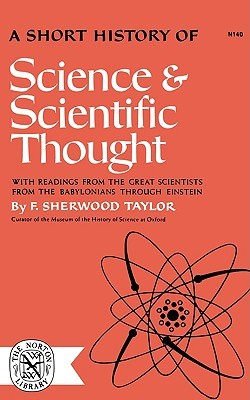

 |

|

The average rating for Short History of Science and Scientific Thought - Sherwood F. Taylor - Paperback based on 2 reviews is 5 stars.
Review # 1 was written on 2013-05-06 00:00:00 Christopher Hight Christopher HightAn overview of English Constitutional history from the Middle Ages forward. The book was assembled posthumously by his students from his lecture notes, but even so his distinctive style and diction appears. The medieval chapter is notably redundant with his History of English Law to the reign of Edward I. Maitland's approach is to survey the "state of the constitution" at various points. He chose: the death of Edward I, the death of Henry VII, the death of James I, the death of William III, and the 1880s. You will notice that none of those correspond to major disruptions in the government or conventional break-points. This is by design and Maitland remarks on this. His goal is to show the constitution at the times where it is more or less well-defined; there was no clarity about the constitution when Henry took the throne in 1485 or in 1660 at the restoration. He is anxious to push back against common myths, some of which are still circulating: There is one term against which I wish to warn you, and that term is 'the crown.' You will certainly read that the crown does this and the crown does that. As a matter of fact we know that the crown does nothing but lie in the Tower of London to be gazed at by sight-seers. No, the crown is a convenient cover for ignorance: it saves us from asking difficult questions, questions which can only be answered by study of the statute book. I do not deny that it is a convenient term, and you may have to use it ; but I do say that you should never be content with it. If you are told that the crown has this power or that power, do not be content until you know who legally has the power — is it the king, is it one of his secretaries: is this power a prerogative power or is it the outcome of statute? [In contrast] We must not think, even now-a-days, of 'the seals of office' as mere ceremonial symbols like the crown and the sceptre; they are real instruments of government. Without a great seal, England could not be governed. Every corporation, this University for instance, has as perhaps you know a common seal, and a great many things can only be done by the use of the common seal. It is somewhat the same with the seals of office: courts of law take notice of these seals, and insist that they must be affixed. There's a scanned copy available online: The .txt ebook text is corrupted but still more or less readable and I've been reading that. |
Review # 2 was written on 2016-03-04 00:00:00 Greg Stark Greg StarkI had to read a chapter in this book about feudalism for a European economic history course I took. In my opinion, the prose was rather dry. |
CAN'T FIND WHAT YOU'RE LOOKING FOR? CLICK HERE!!!